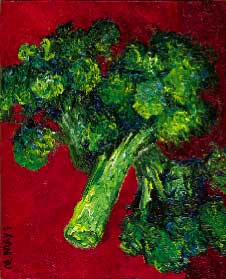 | |
|
Broccoli Love
IF YOU'VE ever had an apple tree that wouldn't bear fruit it might have lacked a mate. Plants need lovers too. And even though hermaphroditic plants can (and do)
self-pollinate, most shouldn't. Inbreeding often causes recessive abnormalities like the propensity for disease and low seed production.
To counteract the self-pollinating temptation, about 50 per cent of flowering plants species have something known as "self incompatibility" or SI. Exactly how the process
works isn't entirely known. But biology professor Daphne Goring and research assistant Sophia Stone have come one step closer to understanding Nature's mysteries.
The clue seems to lie in the plants themselves. "It is a genetic thing," says Goring, who has isolated the second plant gene known to be involved in the process of inhibiting
self-pollination. Dubbed "ARC1" the gene helps prevent self-pollination in canola, broccoli and cauliflower.
To test ARC1, Goring teamed up with Pioneer Inc. Labs, a leader in agricultural bio-engineering. Researchers found that when ARC1 was removed from a plant's pistol, SI
failed, proving it was a vital link in the recognition and rejection process.
Goring says that understanding plant cells might eventually provide clues to understanding human diseases, like cancer. Until then the results will promote future studies in
the applications to agriculture and plant evolution.
Says Goring: "SI is a little picture, but it's part of a much bigger one. And in science it's often important to consider the little picture first." Broccoli illustration: Matt Mays |
|
Text Menu [ Home | Past Issues | Subscriptions | Contact Us | Site Map | Search Profiles ] |
